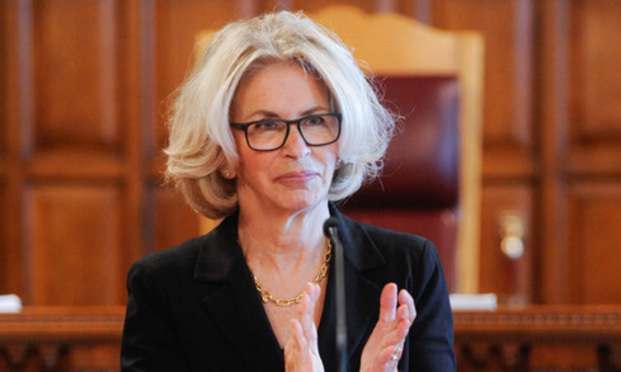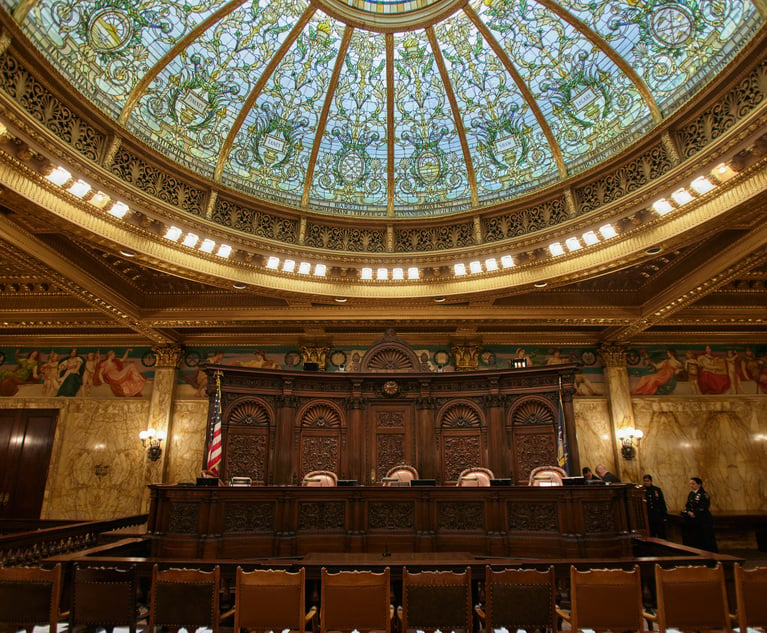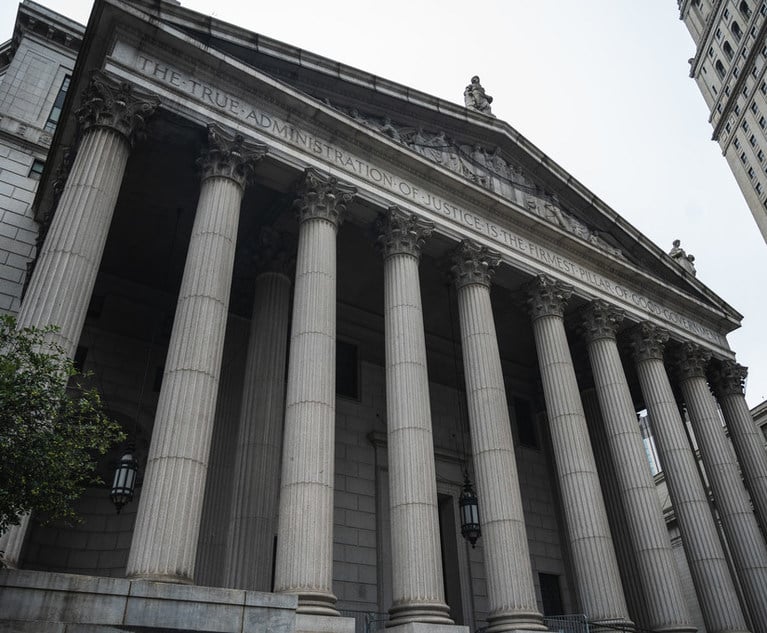DiFiore Adds Protections for Transgender Persons in NY Judicial Conduct Rules
DiFiore said in a public notice entered into the state register that the change, an amendment to the Rules of the Chief Judge, was made in consultation with the Administrative Board of the Courts and with the approval of the Court of Appeals.
January 11, 2019 at 03:44 PM
3 minute read
 New York Chief Judge Janet DiFiore. Photo: Tim Roske
New York Chief Judge Janet DiFiore. Photo: Tim Roske
Chief Judge Janet DiFiore has amended her code of ethics for non-judicial employees of the state court system to add gender identity and expression as protected classes.
DiFiore said in a public notice entered into the state register that the change, an amendment to the Rules of the Chief Judge, was made in consultation with the Administrative Board of the Courts and with the approval of the Court of Appeals.
The proposal to add protections for transgender people into the court system's rules came from the Richard C. Failla LGBTQ Commission of the New York State Courts, which had expressed concerns to Lawrence Marks, the chief administrative judge of the Office of Court Administration, that the rules weren't fully inclusive for all members of the LGBTQ communities.
“Extending these provisions to include 'gender identity' and 'gender expression' will aid in the public efforts to institutionalize the judiciary's commitment to eradicating discrimination and bias against all persons regardless of their sexual orientation, gender identity, or gender expression,” the commission said in a 2017 letter to Marks.
Appellate Division, Third Department Presiding Justice Elizabeth Garry, a past co-chair of the commission who still serves as a member, said the rule change was also intended to apply to attorney conduct toward transgender persons.
“That's a population that really needs express recognition and the clear protection of the law,” Garry said.
The two other branches of New York State government have also made moves to extend protections for gender identity.
In 2015, Gov. Andrew Cuomo issued an executive order banning discrimination based on gender identity in housing, employment and other areas.
A bill that would add gender identity as a protected class in the state Human Rights Law, the Gender Expression Non-Discrimination Act, has been pending in the state legislature for 15 years—it has been passed through the State Assembly numerous times but has failed to make it through the State Senate.
Read more:
NY's First Openly LGBTQ Presiding Justice 'Proud' of Distinction—but Not Defined by It
New Executive Director, Co-Chair Named to LGBTQ Commission
Gov. Cuomo Appoints Presiding Justices Including First Openly LGBTQ Presiding Justice in NY
This content has been archived. It is available through our partners, LexisNexis® and Bloomberg Law.
To view this content, please continue to their sites.
Not a Lexis Subscriber?
Subscribe Now
Not a Bloomberg Law Subscriber?
Subscribe Now
NOT FOR REPRINT
© 2025 ALM Global, LLC, All Rights Reserved. Request academic re-use from www.copyright.com. All other uses, submit a request to [email protected]. For more information visit Asset & Logo Licensing.
You Might Like
View All
Decision of the Day: Trial Court's Sidestep of 'Batson' Deprived Defendant of Challenge to Jury Discrimination

Decision of the Day: Commercial Division Finds Defendant Engaged in Unfair Competition Against Plaintiff

Decision of the Day: Court Rules on Judgment Motions Over Police Killing of Pet Dog While Executing Warrant

Decision of the Day: JFK to Paris Stowaway's Bail Revocation Explained
Trending Stories
- 1Uber Files RICO Suit Against Plaintiff-Side Firms Alleging Fraudulent Injury Claims
- 2The Law Firm Disrupted: Scrutinizing the Elephant More Than the Mouse
- 3Inherent Diminished Value Damages Unavailable to 3rd-Party Claimants, Court Says
- 4Pa. Defense Firm Sued by Client Over Ex-Eagles Player's $43.5M Med Mal Win
- 5Losses Mount at Morris Manning, but Departing Ex-Chair Stays Bullish About His Old Firm's Future
Who Got The Work
J. Brugh Lower of Gibbons has entered an appearance for industrial equipment supplier Devco Corporation in a pending trademark infringement lawsuit. The suit, accusing the defendant of selling knock-off Graco products, was filed Dec. 18 in New Jersey District Court by Rivkin Radler on behalf of Graco Inc. and Graco Minnesota. The case, assigned to U.S. District Judge Zahid N. Quraishi, is 3:24-cv-11294, Graco Inc. et al v. Devco Corporation.
Who Got The Work
Rebecca Maller-Stein and Kent A. Yalowitz of Arnold & Porter Kaye Scholer have entered their appearances for Hanaco Venture Capital and its executives, Lior Prosor and David Frankel, in a pending securities lawsuit. The action, filed on Dec. 24 in New York Southern District Court by Zell, Aron & Co. on behalf of Goldeneye Advisors, accuses the defendants of negligently and fraudulently managing the plaintiff's $1 million investment. The case, assigned to U.S. District Judge Vernon S. Broderick, is 1:24-cv-09918, Goldeneye Advisors, LLC v. Hanaco Venture Capital, Ltd. et al.
Who Got The Work
Attorneys from A&O Shearman has stepped in as defense counsel for Toronto-Dominion Bank and other defendants in a pending securities class action. The suit, filed Dec. 11 in New York Southern District Court by Bleichmar Fonti & Auld, accuses the defendants of concealing the bank's 'pervasive' deficiencies in regards to its compliance with the Bank Secrecy Act and the quality of its anti-money laundering controls. The case, assigned to U.S. District Judge Arun Subramanian, is 1:24-cv-09445, Gonzalez v. The Toronto-Dominion Bank et al.
Who Got The Work
Crown Castle International, a Pennsylvania company providing shared communications infrastructure, has turned to Luke D. Wolf of Gordon Rees Scully Mansukhani to fend off a pending breach-of-contract lawsuit. The court action, filed Nov. 25 in Michigan Eastern District Court by Hooper Hathaway PC on behalf of The Town Residences LLC, accuses Crown Castle of failing to transfer approximately $30,000 in utility payments from T-Mobile in breach of a roof-top lease and assignment agreement. The case, assigned to U.S. District Judge Susan K. Declercq, is 2:24-cv-13131, The Town Residences LLC v. T-Mobile US, Inc. et al.
Who Got The Work
Wilfred P. Coronato and Daniel M. Schwartz of McCarter & English have stepped in as defense counsel to Electrolux Home Products Inc. in a pending product liability lawsuit. The court action, filed Nov. 26 in New York Eastern District Court by Poulos Lopiccolo PC and Nagel Rice LLP on behalf of David Stern, alleges that the defendant's refrigerators’ drawers and shelving repeatedly break and fall apart within months after purchase. The case, assigned to U.S. District Judge Joan M. Azrack, is 2:24-cv-08204, Stern v. Electrolux Home Products, Inc.
Featured Firms
Law Offices of Gary Martin Hays & Associates, P.C.
(470) 294-1674
Law Offices of Mark E. Salomone
(857) 444-6468
Smith & Hassler
(713) 739-1250






